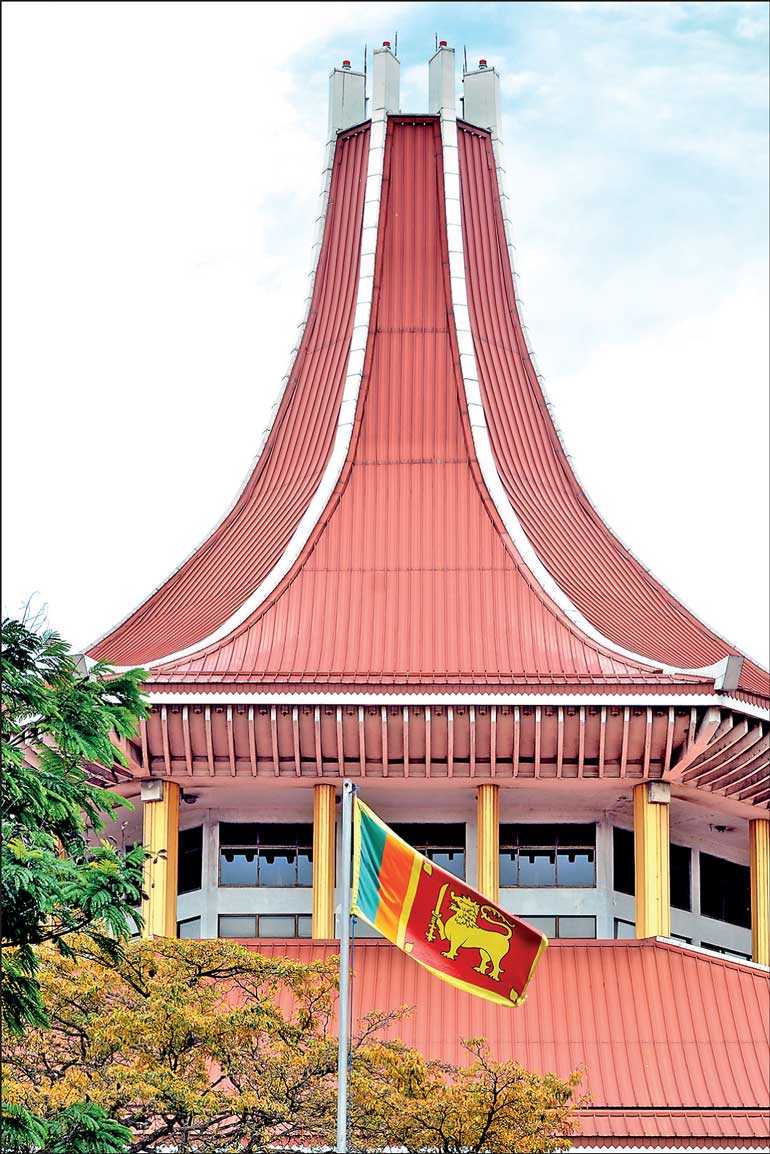Tuesday Feb 17, 2026
Tuesday Feb 17, 2026
Friday, 12 June 2020 00:00 - - {{hitsCtrl.values.hits}}

The Executive, the Legislature and the Judiciary can be described as the three main pillars of support of any form of democratic political system. The sovereignty of a democratic political system rests with the  citizens of that state.
citizens of that state.
The Constitution is reckoned to be a written agreement which illustrates how the sovereignty of the people in a democratic State shall be exercised through the Executive, the Legislature and the Judiciary and the manner in which the system of governance is structured and how it is implemented. It constitutes the fundamental law of the country and all the other laws should be implemented subject to, and in conformity with it.
While the Legislature is responsible for enacting the laws and determining the public policy of the State, the Executive is responsible for implementing and enforcing them. It is the responsibility of the Judiciary to protect and nurture the Constitution when either or both of these institutions violate the Constitution.
Status of the three pillars in Sri Lanka
The condition of the three pillars of the State of Sri Lanka is not of high quality and their overall functioning cannot be regarded as either formal or optimal. The balance that should necessarily be maintained between the three pillars does not exist at a satisfactory level. So much so, this institutional trio has consistently displayed its inability to accomplish the duties and responsibilities assigned to them. This failure being a long-standing and ever-growing issue, the all three pillars have now reached a state of decay or near collapse.
Since independence, Sri Lanka has had a Legislature that did not respect the Constitution. It was often violated by the political parties that ruled the country for their parochial political gains. The Executive too, was no different. After the establishment of a system of executive presidency, the executive president too, at times, with the connivance of the Legislature adopted a policy that violated the Constitution for narrow political gains. When the Constitution was violated either by the Legislature or the Executive, it was unfortunate that the Judiciary, on which the responsibility of protecting the Constitution lies, failed to fulfil its obligation and arrest the trend.
The image of Sri Lanka would not have been as ugly as what it is now, provided there was a Judiciary to uphold the sanctity of the Constitution when it was violated at different times by the Legislature or the Executive, singly or collectively. Despite, the inability of Sri Lanka to build the nation, it could still have been possible to avoid the disintegration of the nation if the Judiciary, based on the spirit and the philosophy of the Constitution, had intervened in defending the rights of the minorities; similarly the judgments passed by the Judiciary in this respect would have become the foundation of the nation’s structure for building of the Sri Lankan nation.
Making certain institutions that ought to function independently free from interference of the political authority can be considered the most significant thing expected of the 17th and 19th Amendments. However, the independent commissions established under the system of the Constitutional Council have not rendered much to improve the functioning of the Judiciary, the Bribery or Corruption Investigation Commission, the Police or the Central Bank. What we have in Sri Lanka is a system of commissions that changes with the change of the government in power. It clearly shows that the degeneration and rotting of the institutional system cannot be overcome by simple reforms.
Judiciary
Sri Lanka had a thriving judicial system during the British rule. The Judiciary at that time was not hesitant to pass judgments even against the Governor of the country, the most powerful officer of the government.
With independence, India replaced the judicial system inherited from the British with a system most suited to the indigenous needs of the country. It is an independent judicial system which is well-versed in democratic values and public rights and free from political interference. At present, the Indian High Courts is acclaimed to be one of the best High Courts in the world.
After independence, Sri Lanka not only did not take measures to adopt a new judicial system suited to the needs of the newly-gained freedom, but also refrained from showing an interest in preserving the high standards of the old judicial system inherited from the colonial administration. It was the Judges of European origin and the community of Burgers who constituted the backbone of the old judicial service.
Following independence, both European and Burger judges left Sri Lanka and the vacancies created by their departure were filled by indigenous people who did not have acumen and adequate practice in the judicial field. Though they were well versed with the Law, they didn’t have a proper understanding of the role of the Judiciary in a democratic political system.
The post-independence Judiciary falling into a stage where it tended at times to team up with ruling parties that came to power from time to time can be considered as an unseemly outcome of this situation. By the first Republican Constitution of 1972, the appointments to the Judiciary were brought under the jurisdiction of the Cabinet of Ministers and the Judiciary was deprived of its authority for judicial review it had hitherto enjoyed.
Judicial review is a process under which Executive or Legislative actions are subjected to review by the Judiciary. A court with authority for judicial review may invalidate laws, acts and governmental actions that are incompatible with the Constitution. Judicial review is one of the major elements of the checks and balances in the separation of powers.
Although the Second Constitution of 1978 included a fundamental rights clause, the Judiciary was not given full authority for judicial review except only a nominal power of judicial review. Political interference in the Judiciary increased following the establishment of a presidential system of governance. However, during the tenure of Chief Justice Neville Samarakoon, the Judiciary acted independently to a large extent, despite the threats and groans from the Government. This enthusiasm and the wholesome atmosphere lasted for about 20 years and again it was corrupted and crushed during the tenure of the Chief Justice Sarath Silva.
Inaction or non-involvement of the Judiciary in safeguarding the Constitution on occasions where it was violated by the ruling party in power for narrow political advantages can be regarded as a weak feature inherent in the foundation of the Judiciary of Sri Lanka. The number of occasions where the respective ruling party in power had been allowed to violate the Constitution had been much more than the number such occasions thwarted. It was only on two occasions that the Judiciary had adopted a policy of protecting the Constitution when the ruling party had attempted to violate it.
During the regime of President Chandrika Kumaratunga, the Judiciary introduced a system for the members of the Opposition to join the Government without losing their parliamentary seats which was contrary to the principles of the Constitution. This not only led to establishing a system in which the MPs could sell themselves for a price but also to distort the entire system of governance. To date, the Judiciary has not rectified this error in toto.
The Legislature and the Executive
Despite the changes made in 1972, Sri Lanka maintained a parliamentary system of government until the promulgation of the 1978 Constitution. In that system, the Cabinet headed by the Prime Minister, elected from among the Members of Parliament, functioned as the centre of State power.
The Second Republican Constitution abolished the system in which the Parliament had been given prominence so far and introduced a system that conferred all the powers of the State to the president elected by the public vote. With this change the Parliament was reduced to a level of a rubber stamp of the president.
During the old parliamentary system, getting elected to Parliament or being appointed to a higher official position such as the prime minister or cabinet minister did not offer an opportunity to make money on a large scale. On the contrary, being a Member of Parliament those days had been more a way to lose wealth than to earn. The allowances paid to MPs remained at a very low level while the doors to illicit wealth had been tightly closed. The law was strictly enforced against whomever who was found committing an offence even on a rare occasion.
But, President Jayewardene turned this rich tradition which hitherto existed upside down. J.R. Jayewardene, in addition to granting privileges not usually provided to MPs in a democratic political system, persuaded them to transact business with the government with opportunities being provided to do so, in violation of the law. Nowhere in the world are members of Parliament in any democratic country allowed to transact business. It is considered an offense punishable with the deprivation of office held by the accused. The law in Sri Lanka also is the same.
President Jayewardene ignored the law and allowed MPs of the ruling party to buy State plantation land at a nominal price, making them landowners and planters. Apart from that, they were permitted to do various businesses with the government. All the presidents who had succeeded JR followed suit, adding new elements to the corrupt, predatory and illegal tradition introduced by him.
As a result thereof, the majority of the members of Parliament have obtained State lands, revenue earning licenses for businesses of liquor, passenger transport, duty free shops, timber, stone, sand, and re-exports, illegally and thereby becoming entrepreneurs transacting business with the government, contrary to the law. This corrupt system can be said to have made not only the MPs but the Presidents as well, extremely rich and wealthy.
This corrupt and predatory system, in addition to depriving the legislature and the executive of their legitimacy, has caused to corrupt and rot the State and all its institutions. It can be reckoned to be an important factor that has contributed to plunge the country into a state of bankruptcy.
I expect to explain the democratic and the legitimate system that could be adopted to save the country from this unfortunate and miserable situation, in the next article.